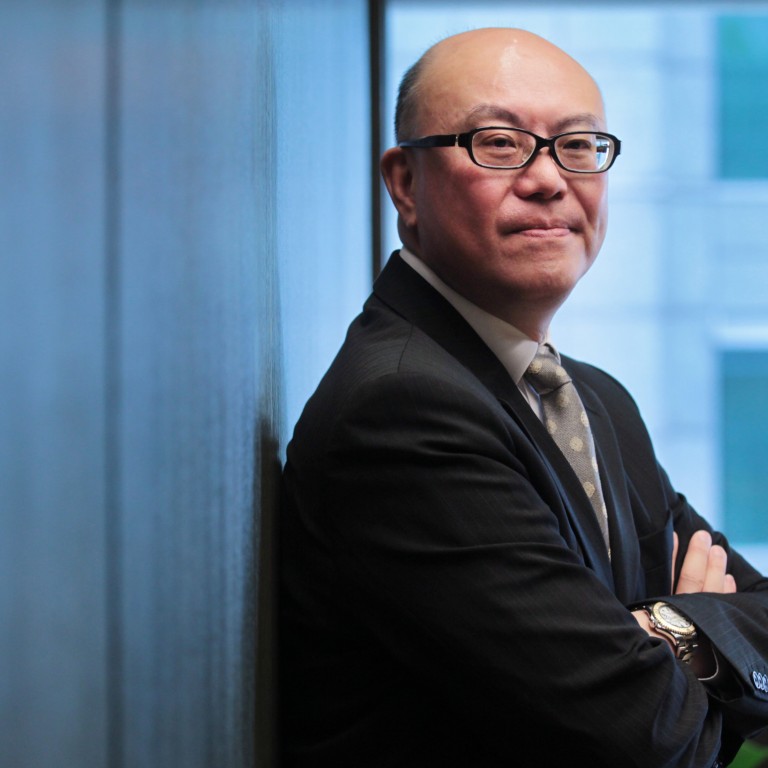
You don’t need to own a flat to improve your living environment
Nan Fung Development’s Donald Choi sees growth potential in luxury residences, hotels and offices, but is cautious when it comes to land bidding due to changing government policy
Donald Choi Wun-hing worked in the well-known architecture firm Foster and Partners for eight years before he joined Nan Fung Development, where he is managing director.
As an architect, he is familiar with the various aspects of property development, from town planning and design to construction.
It has helped him lead the company in overcoming the challenges in the property market.
The late Chen Din-hwa founded Nan Fung Textiles in 1954 and expanded into the property market in the 1960s. Now Nan Fung Development, under the leadership of Chen’s daughter, Vivien Chen Wai-wai, is the fifth-largest developer in Hong Kong in terms of asset value and has expanded onto the mainland.
Choi spoke to the South China Morning Post about the firm’s strategy, the government’s housing policy and the prospects for the property market.
Q: The business environment is challenging, as the property market has entered a down cycle. What’s your strategy in land acquisition?
A: It depends on our competitiveness and how we can retain our edge. As our company is familiar with the luxury residential market, we will pay more attention to luxury sites.
If it is not a market where we have development experience, we will be cautious and conservative.
But if the market has development potential, we will explore it, such as the hotel market. The hotel industry is growing at a rapid pace. We have opened our new hotel [Courtyard by Marriott Hong Kong Sha Tin].
In the retail market, our shopping malls are located in new districts. We plan to carry out a large renovation programme in Tseung Kwan O Plaza. We will study the potential of the retail market.
There is development potential in the office market, as the expensive rents in Central have led to office decentralisation. We developed Octa Tower in Kowloon Bay as one of the first movers in the district.
Q: What is your plan for residential sales this year?
A: We will launch two new joint-venture projects with Cheung Kong this year. The projects are City Point in Tsuen Wan and Hemera, Phase 3 of Lohas Park, in Tseung Kwan O.
Including the remaining flats at our project, The Visionary, in Tung Chung, the three projects could provide more than 4,000 flats.
If we win presale consent from the government, we hope to launch our joint-venture project with Wai Tai Properties at Ko Shan Road in Ho Man Tin.
In the fourth quarter, we may launch our luxury project in Mount Nicholson Road in Mid-Levels East if we receive presale consent and our preparation work is ready.
Q: Demand for luxury flats turned weak after the government announced a new series of cooling measures in February last year. Are you worried about the sales of your luxury project in Mount Nicholson Road?
A: No. The new supply of high-end residential on Hong Kong Island is tight. The demand is strong. You can see that the luxury project at Barker Road on the Peak [developed by Hutchison Whampoa] was able to achieve a good price recently. We believe there is certain demand for luxury residential if our product is good.
Q: The US Federal Reserve plans to raise interest rates in the second half of next year. What will be the impact in property market?
A: The rise in interest rates is expected. I don’t think they will rise sharply. If they rise significantly, it will mean the US and Europe economies have recovered. Then, the Hong Kong and mainland economy will benefit.
Q: Many analysts expect Hong Kong property prices to drop more sharply next year, when new housing supply increases significantly and interest rates rise. What’s your view?
A: It’s hard to say. But construction costs are increasing. If the economy remains positive, I can’t see what would lead to a fall in property prices. Although new housing supply will increase from 8,000 flats a year previously to 13,000-15,000 flats a year, it remains at a historically low level.
Q: What obstacles are developers facing?
A: It is true that town planning should follow the changes in society’s demands. But it would cause uncertainty for developers if there is a big change in town planning in short run.
For example, if there are only five residential sites in the area on the day when I join the bidding for a plot of land, but the government rezones five more sites for residential development the next day, then my bid would have been too high.
That is the reason why developers have become more cautious in bidding for land – they are not sure if there will be any changes in policy.
Q: Do you have any comments on housing policy and the property market?
A: My personal opinion is housing is a livelihood problem, not a market problem. I agree the government should increase the supply of public housing.
But I question whether it is necessary to own a flat in order to improve one’s living environment. It may not be suitable for future development, with higher migration.
Hong Kong’s young people should use their knowledge to work abroad and gain more experience. Their goal should not be limited only to buying a flat. The dream of buying a flat is currently too difficult to achieve.

